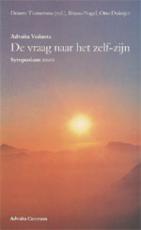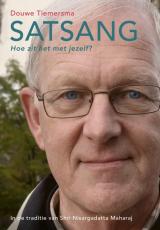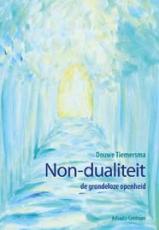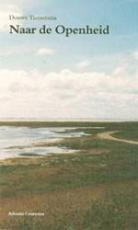Advaita Post 10-07 - If you are open to it, you recognize it...

Volume 10 No 7 (April 21, 2009)
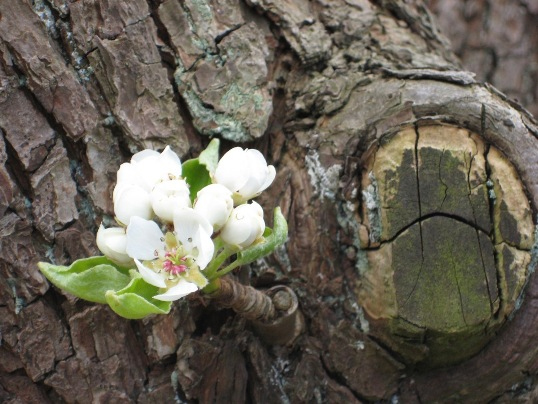
Text
Presentation of the book Non-Duality - The groundless Openness November 21, 2008 - Part 1: Kees Boukema and Douwe Tiemersma on their experience of non-duality and social involvement
(Heavily condensed - the full text in the Dutch language can be found on the website)
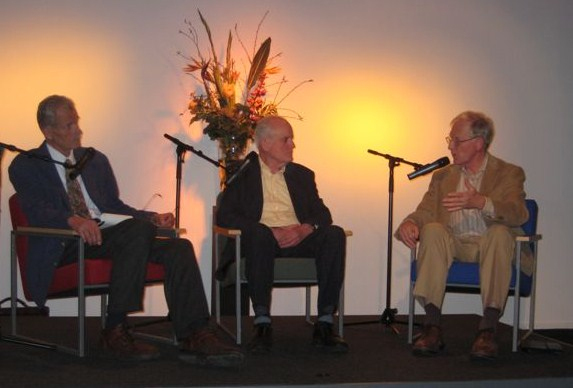
The book 'Non-duality' made the impression of a mosaic on me, a mosaic of classical texts, short considerations, little poems, questions and answers. They all revolve around one theme, the theme Douwe Tiemersma since his first publication - in 1983, now twenty-five years ago - has termed the 'Openness'. [...]
Douwe has always invited and encouraged us to examine ourselves and to reflect on our own experiences. Attention, self reflection and becoming aware are the key themes of this book. It is, you could say, an approachable examination of our own consciousness. Everyone can experience that in their consciousness there are no limits other than the limits that we ourselves have imposed. Everyone can examine himself and see that this is so. Douwe writes: "If you go along, it is the end of yourself as a fixed position. Very simple. If only you let it happen." (p. 143). [...]
There are a number of pieces in this book that I have seen previously, a number of autobiographical fragments, for example. In re-reading them I was again impressed with the precision and frankness with which Douwe writes about his childhood and his encounter with his teacher, Sri Nisargadatta Maharaj. Additionally, there were pieces that I had not previously read. So I was pleasantly surprised by his Ode to the Snekermeer. And especially in the Frisian language!
The being-experience of non-duality
A question that remained with me while reading this book was this. Non-duality and openness, as I understand it, are not describable in positive terms; the words that are used remain inadequate. It is a state in which any separation between consciousness and non-consciousness disappears. (p. 42)
I understand very well, that it is difficult, if not impossible, to bring into words a being-experience that has no contents. But can't there be even a question in advance? Namely: What does that which men attempt to bring into words have to do with that which men have experienced? When talking about the experience of the self-being, it is said that the 'I' dissolves (p. 153), is swept away or forgotten (p. 190). [...]
Douwe says (p. 81): "It can become recognized as truth, but not formulated ... there is feeling-awareness beyond language... It is not a perception, rather you merge into it. But you do have knowledge of it." And further on (p. 201): "The "I" falls away. The observer falls away. A blank state. And still there is an internal knowledge of the original state." [...] However, if I wake up from a deep dreamless sleep, I can say: "I had a great sleep!", but what I say is: "I feel refreshed and well rested, I feel ready to begin a new day!" A real memory of the experience of that dreamless sleep I naturally don't have, because my consciousness was not functioning, or perhaps it was not there at all.
My question therefore is: Wouldn't it be exactly the same in the 'being-experience' of non-duality? That it's not the inadequacy of language that is the main obstacle, but rather the unreliability of the impressions that remain in the mind after the 'being-experience' of non-duality. Are they not the projections which my mind produces, that serve as the limitations on the level of my own existence? Perhaps we can only say: "There is something that has happened to me whereby I am totally changed. I am no longer the person that I was, but what exactly has happened, I don't really know."
Non-duality and social involvement
Another point that I encountered while reading is that sometimes there is a deliberate distance from everyday reality. A distance that is more than 'detachment', but seems to be a form of world alienation. I must explain. On page 90 there is an account of a talk that took place in Gouda on January 8, 2005. Douwe refers at a given moment to a major natural disaster, that had taken place a few days earlier: the tsunami, a suddenly arising tidal wave that had washed away villages in South Asia and cost many people their lives. [...]
I quote: "It is wonderful to lie by the sea to enjoy a winter holiday in the tropics. It is a luxury that westerners can afford to take for granted. But the taking for grantedness becomes swept away by a tidal wave that comes. Then the assumption breaks wide open. Everything is so open that it's no longer possible to close the gap. Therefore it's unspeakable." I think that we westerners certainly can't afford our 'luxury winter vacations in the tropics'. If we fail to change our way of life and continue to persevere in a cultural pattern of waste of energy, raw materials and pollution of the environment then we are accomplices to the crime of "biocide", eradication of life here on earth. [...]
With the practice of advaita it is continually encouraged that people "always stay open towards everything and everyone is to be accepted positively" (see p. 114 and 115). Douwe, I would like to ask: Are there situations besides those where one can open up and positively accept, but also those where one must reject and fight? Doesn't that belong to, as you write "a condition in which one clearly sees what is going on" (blz.129)? Is there, in other words, only mention of surrender, or is resistance sometimes required? [...]
Douwe Tiemersma:
Yes, first of all: it is a festive gathering and it's wonderful to be together here. It is a party, because the book 'Non-duality' has been published. It's a miracle that suddenly appears, just as all creation. Yes, it's a party when that happens, especially when we celebrate with one another. That's really nice. I am glad that Kees and Otto have said that they have prepared themselves to bring up a few things from the book. It is a festive gathering, but we said right away: please, let's make it a bit of substance. We can then discuss certain points of the book in order to further clarify them.
Kees asked if I wanted to respond immediately to what he said about responsibility. I can indeed be short with it. Kees, you are mistaken. Non-duality and social responsibility go together for sure. I will say more about that, but to start I'll go to your first point.
The being-experience of non-duality
When Kees asks about the nature of the being-experience of non-duality, it should first be clear that non-duality shows itself in different ways. In the book, I have differentiated three types of non-duality. [...]
Kees asks about the being-experience of the deep blank of self-being. The actual experience exists. You can focus on it, for example, as you let yourself relax. If you remain somewhat aware internally when you go to sleep, you sink delightfully away and the borders that were there at first, disappear. You can easily find that nothing remains, nothing other than the blank atmosphere of self-being where you happily go to sleep. As soon as a contrast is created by thinking, then you no longer sleep. So the blank sphere is best recognized by people for when they have rested well. Separations disappear and everything that still is, is present in your own sphere. That can continue further until there is a dreamless sleep. Usually it is not recognized, because in the morning you get up and say: "I slept wonderfully." Can you say anything more about that wonderful sleep? No, only that: it was delightful. There is knowledge of it, but you can also have a clearer being-experience of it.
That experience of a blank sphere may also exist in other situations. In meditation you stop thinking and find that nothing is. If you just go within and you relax there, you might notice that in this atmosphere of self-being no forms need to arise. As you become a little more familiar with it, you recognize it in more and more places. At a given moment you also recognize it consciously in the dreamless sleep. It is an actual knowledge of your own sphere of being. The one being-knowing, but you can't say anything more than that it's blank. [...]
As you have already frequently recognized, there is the understanding, this is the foundation of everything that is always there; from out of that everything arises. When you slowly awaken, you experience the construction of reality and of the new day: "How is it already here once again? What day is it and what should be done? " Slowly, the construction appears that connects that with what has happened previously. Then you usually say: there is a time frame wherein there's no break between yesterday and today. That is thus the reality for you. But what actually happened - and if you are open to it, then you recognize it - is indeed a fundamental break with that which you normally take for reality. In all gaps, you can recognize something of the openness, over which you can't say anything, but out of which everything arises. That is the idea that you can find all different kinds of traditions, for example in the Upanishads which are very clear about it. There is a basis from out of which everything comes and that something is not different from yourself. [...]
Social responsibility
At the beginning of my response to Kees' comments I said that non-duality and social responsibility do go together. That combination is there in a very special way and I can say something about it.
Of course I fully agree with Kees, that if western people took it for granted to go to Thailand to lie in the sun in the wintertime, this should be questioned for many reasons. But of course, that was not the point. It was an example to demonstrate that the reality of what people take for granted can suddenly breakthrough in many places. [...]
The issue of responsibility in the approach of non-duality doesn't lie on the personal level. Just when more openness in your own sphere of being is possible within your personal life, a genuine openness to others unfolds itself. There is an expansion of your own self-being, a non-duality with others. You are the others in their self-being. Such openness also means an internal sensitivity for what is happening, also for the suffering. There is then an acceptance such that the distance and the boundaries disappear. There is an acceptance of everything and everyone, also of the suffering. There is no resistance and you don't hold anything back. No, in the openness everything is allowed to be as it is. And as everything is allowed to come, there also is an internal sensitivity to what is there. When there are wrongs, they become clear.
How does it continue then? In the openness you see that everything falls into place as if by itself. If everything becomes open, there is no longer an 'I want' and 'I do' anymore. There is a universal presence of feeling being-awareness. Within which everything happens by itself in what is best for the situation, in a natural way, exactly because the "I" and "I"-interests no longer play a role. [...]
Er is geen tweeheid
als je ontspannen bent
in zelf-bewustzijn
is dat duidelijk.
Boeken
Douwe schreef en redigeerde gedurende zijn leven boeken. Via onze uitgeverij zijn deze nog verkrijgbaar.
